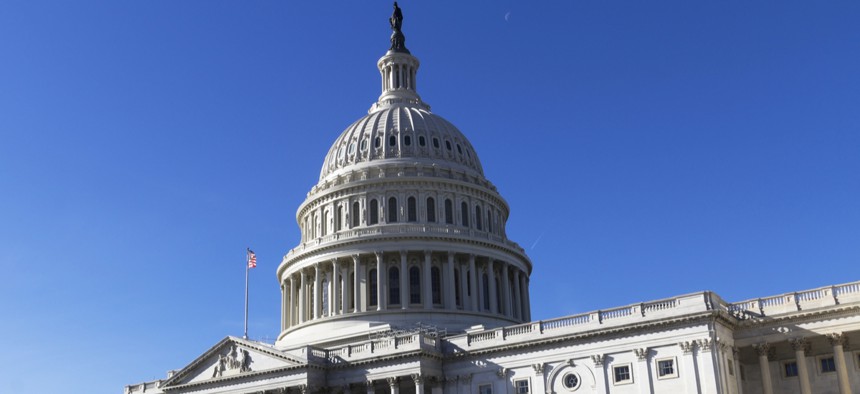A Push to Preserve the New Markets Tax Credit

The East Front of the U.S. Capitol Shutterstock

Connecting state and local government leaders
The future of the credit, which helps provide low-cost financing for projects in struggling communities, has been caught up in the tax debate unfolding in Congress.
WASHINGTON — Proponents of a tax credit meant to attract investment toward low-income communities continued a push on Capitol Hill this week to preserve the program, as Republicans entered the final stages of their effort to revamp the U.S. tax code.
New Markets tax credits may not be a marquee item in the tax debate. But the fate of the program in future years will have implications for economic development initiatives and business financing options in poor areas. It could affect local government tax revenue as well.
Sen. Rob Portman, an Ohio Republican on the conference committee of House and Senate lawmakers negotiating a consensus tax package, said he hopes the credit will be maintained in any final bill.
"I think it more than pays for itself, leveraging a lot of private dollars," Portman said Wednesday. He added: "It's something I'm promoting."
Tax legislation the U.S. House has passed would phase out the New Markets program, along with a credit that helps offset renovation costs for historic buildings. A Senate-approved bill would leave the New Markets credit intact and scale back the one for historic rehabilitation.
Although GOP lawmakers and others taking part in the conference process indicated Wednesday they'd arrived at a broad agreement on the tax bill, there were still open questions about how specific parts of a final bill could look, like the provisions affecting the credits.
The conference committee is expected to release its version of the tax legislation on Friday. And final votes on the bill are anticipated in the House and Senate early next week.
On Wednesday, the New Markets Tax Credit Coalition, which advocates for the credit, held its annual conference here.
"Certainly, for tax reform, we need the Senate position," said Bob Rapoza, a spokesperson for the group.
"If you think about community development spending across the federal government," he added, "as a percentage of GDP, that's been cut by 75 percent over the last 30 years. So for many communities the New Markets tax credit is really an essential tool for community facilities, for manufacturing, for small business loan funds."
Attendees at the conference were headed to Capitol Hill on Wednesday afternoon to lobby in support of the tax credit.
In a new report the coalition touts the program's results. The report looks at 4,980 projects that received nearly $42 billion in New Markets Tax Credit financing between 2003 and 2015.
Projects include community oriented facilities like health care clinics, schools and events spaces such as theaters, as well commercial ventures involving office space, grocery stores and manufacturing.
Investments between 2003 and 2015 resulted in about 333,000 direct jobs, in addition to construction employment, according to the report. In 2015, the report says, New Markets investments generated about $501 million in state and local tax revenue and $871 million in federal tax revenue.
Based on the coalition's estimates, federal tax revenues exceeded the cost of the program in 2015 by about $112 million.
Rep. Tom Reed, a New York Republican, spoke at the coalition's conference on Wednesday. He told Route Fifty afterwards that he was "not very bullish" about the prospect the New Markets and historic tax credits would survive the GOP-tax overhaul completely unchanged.
"I think you're going to see, maybe, some reforms in regards to narrowing them a little bit," he said.
The mechanics of the New Markets program are somewhat complicated. But, in short, it involves investors and lenders contributing money to “community development entities,” or CDEs. CDEs invest the money, commonly in the form of loans, in businesses and other projects in low-income areas.
Organizations that might create a CDE include banks, nonprofits, cities and counties. Investors are typically large banks.
The idea is that the investors benefit from the tax credits, which reduce the federal taxes they owe. And that struggling communities, where credit might be scarce, get access to low-cost financing.
Authorization for the New Markets program is set to expire at the end of 2019. House and Senate Republicans have introduced legislation this year with Democratic and GOP cosponsors to make it permanent.
The tax credit program dates back to 2000, during then-President Bill Clinton's time in office.
Matthew Chase, executive director of the National Association of Counties, recalled that the tax credit program was launched with GOP support during an era when Congress was reconsidering previously established, federal economic development grants.
"The Republicans didn't want to just dole out grant money, and so they said 'we'll create these tax credits that will replace the grants,'" he said.
"Now they want to get rid of it," Chase added. "And New Markets has been very successful."
PREVIOUSLY on Route Fifty:
Bill Lucia is a Senior Reporter for Government Executive's Route Fifty and is based in Washington, D.C.

NEXT STORY: GOP Tax Deal Is Slated to Expand Capped SALT Deduction Proposal





